About the Author
Xing Yu, a former political scientist, worked in two universities successively in the Peoples Republic of China from 1980s to 1990s. He obtained a Bachelor degree in Art after his four-year study of English in the Department of English, Sichuan Foreign Languages Institute in Chongqing, China from 1978 to 1982 and he further obtained a Master degree in Law after his three-year study of international politics in the Department of International Politics of Fudan University in Shanghai, China from 1982 to 1985. This manuscript is the result of his over 20-year effort in academic research. He now lives in the Province of British Columbia, Canada.
Copyright 2013 by
University Press of America, Inc.
4501 Forbes Boulevard
Suite 200
Lanham, Maryland 20706
UPA Acquisitions Department (301) 459-3366
10 Thornbury Road
Plymouth PL6 7PP
United Kingdom
All rights reserved
Printed in the United States of America
British Library Cataloging in Publication Information Available
Library of Congress Control Number: 2013945220
ISBN: 978-0-7618-6200-0 (clothbound : alk. paper)
eISBN: 978-0-7618-6201-7
 The paper used in this publication meets the minimum
The paper used in this publication meets the minimum
requirements of American National Standard for Information
SciencesPermanence of Paper for Printed Library Materials,
ANSI Z39.48-1992
For Lisa
Prologue
This manuscript is about the correlation between language and state or the correlation between the development of language and the building of state. The basic view in this manuscript is that language is not only a means utilized by humans in communication for the purpose of social intercourse, but also a means used by humans to form their state. The reason for me to hold this view is that when we compare a state, a typical community in the civilized society, with a tribe, a typical community in the primitive society, we see that these two types of human community are incomparable in the aspects of population and area. A state usually has a large population. In some cases a state has a population of over one billion people today. But the size of a tribe is usually about several thousand members on average.1 A state is also usually much larger in area than a tribe. Why do people build a community like a state very large in population and area? The states are formed for many reasons. Among these reasons, the desire for the security of peoples lives and private properties in the community and the desire for the realization of justice in the distribution of the interest are often considered by many people to be the two major reasons. By contrast, tribes are formed because of kinship ties. The consciousness of kinship ties only exists in a small community. That is, this community is usually not as large as a state in population and area. Yet the use of language in communication must be a decisive factor for distinguishing a state from a tribe in the aspects mentioned above as language allows for people in a very large number to communicate with each other in a large scope to the effect that a state is formed. The distance of communication performed by using language is a factor. Although we can conclude by using formal logic that spoken language is initially used in communication within a herd of people or a tribe, spoken communication is not a condition for maintaining the tribe, but, in view of the long term development of human community, it is a condition for the final dissolution of the tribe. This is because when people start using language for communication, they are able to use various media in communication. As media enable them to communicate with each other who are far from each other, they expand the scope of their communication and hence the scope of their activities. When they are able to communicate in a large scope so as to allow for many people to communicate with each other, they change the structure of their community. I mean that after people use language for communication for long, they gradually dissolve their tribes and form their states.
Specifically speaking, under the condition that language is used by people for their mutual communication, a change takes place in the method of the formation of human community. If we assume that a tribe is formed because of the mutual interaction performed by those forming the tribe due to the functioning of kinship ties, a state is formed because of the mutual interaction performed by those forming the state due to the use of language for communication. When language is used for communication, people who interact with each other may provide information to each other, indicate intention to each other, share an idea with each other, show sympathy to each other, and make friendship with each other. When they communicate with each other, they may eliminate loneliness. They may feel warmhearted toward each other. They may help each other. They may gain mutual trust. They may cooperate with each other. They may find that common interest is generated whenever linguistic communication is performed. Conversely speaking, cooperation disappears when language is not used or is improperly used. For example, when one lies, the other will no longer trust him. Linguistic communication will fail to function in the transmission of information. We sometimes also see that when one defrauds the other, he will never explain why he defrauds the other. We sometimes also see that when two people encounter any conflict between them, they may refuse to cooperate with each other. Under these circumstances they may refuse to communicate with each other by using language. We may sometimes also see that when one loses temper with the other, he tends not to speak properly but to use his behavior to show how angry he is. He tends not to rely on language for communication as usual. We can sometimes also see that if two people are hostile to each other, they may stop performing linguistic communication and get prepared to fight against each other. All these examples show that when people discontinue performing linguistic communication due to the termination of the related social intercourse, they turn to ignoring the possibility of the creation of common interest that may be formed in the process of linguistic communication.
So I should say that language contributes to the construction of human community such as society and state after the dissolution of their tribes. People always use language when they build society or state. For example, when people communicate with each other by using language, they may make promises to and trust each other. They may sign a contract or an agreement and they may even make and execute other similar documents such as the letter of undertaking, the letter of indemnity, the letter of recommendation or the letter of authorization. We cannot imagine that there is a society in which people never give promises to and trust each other. We cannot imagine either that there is a society in which no contract or similar instrument is signed. When people make promises to each other and hence trust each other or make a contract or any other similar document, they use language. To put it another way, when a contract or the similar document is made, language must be used. The common interest of people must be formed this way or that way. For example, when people perform the exchange of commodities, they may use language to show their intention of exchanging commodities. They realize the exchange of commodities. Thus we see that as men use language, they are able to make a promise and gain mutual trust even though they do not know each other personally. This means that even strangers can cooperate with each other so long as they are able to use language to communicate with each other. So we cannot imagine that people do not use language when they perform economic activities. Similarly, when people build their community, they may argue about how the community should be governed and who should be the governor of the community. If one potential governor and ordinary people discuss about the governance of the community, an agreement may be made about how the community is governed and who should be the governor of the community. So we cannot imagine that when people establish democracy no discussion about how the community is governed and who should be the governor of the community is performed and no consensus is reached. In addition, as linguistic communication is performed, people may share some ideas because when language is used the ideas of one individual person can be passed on to another individual person. Then we cannot imagine that there is a state in which no traditional idea is formed. We cannot imagine either that there is a state in which no religious belief, historical spirit and national consciousness are shown. If we assume that a state is built on the basis of a society that is further built on the basis of the mutual trust of people and at the same time that state is built on the basis of mutual discussion and consensus as well as the formation of traditional idea, religious belief, historical spirit and national consciousness, we should also believe that the state is built on the basis of linguistic communication because mutual trust, the performance of discussion, the formation of consensus as well as the formation of traditional idea, religious belief, historical spirit and national consciousness all appear in the process of linguistic communication.


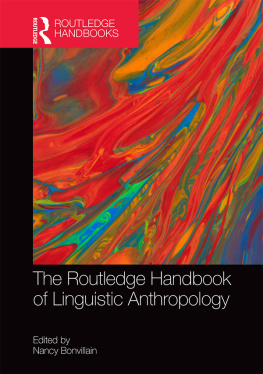
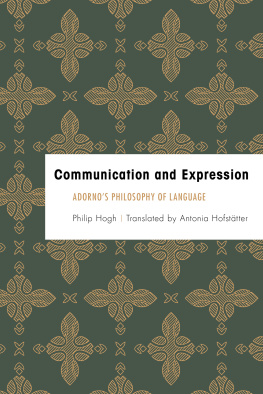
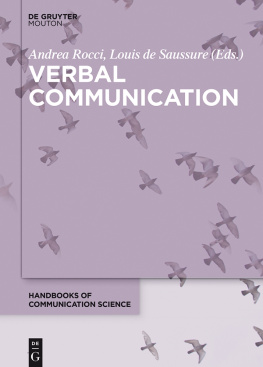
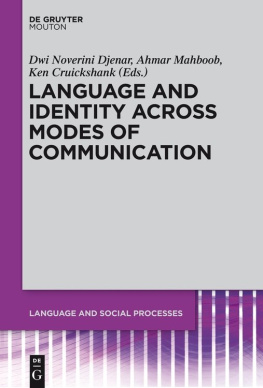
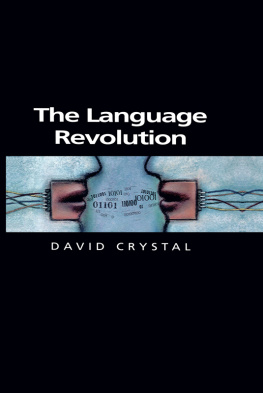
 The paper used in this publication meets the minimum
The paper used in this publication meets the minimum